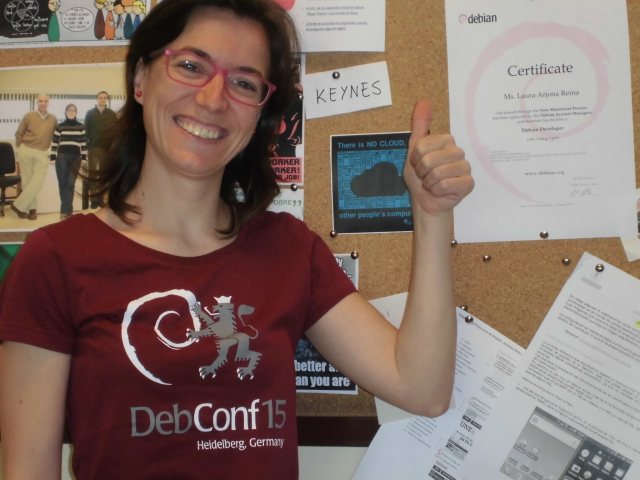 Note: 2015/10/16: I need to add some links but I won t delay this more, posting now, will edit later.
Note: 2015/10/16: I need to add some links but I won t delay this more, posting now, will edit later.
Summer ended long time ago, but believe me, I m still catching up with all the things that I began in June/July, all the things I left in August when I went holidays, and more things that appeared in August and September.
This is a long overdue post, I hope you bear with me for waiting so long, and writing (now) so long too!
June
In June, I was 100% sure that I would not attend
DebConf15 (well, I was 98% sure until then), and when the new
Outreach Sponsorship grants were announced, I decided to write some mails to several Debian contributors, so they consider applying for the grant and attend DebConf (and maybe trigger some i18n/l10n meeting ). They kindly declined, and I understood their reasons, but also wondered what would have happened if the proposal would have come from somebody more official instead of a random contributor that they don t know. I also hoped that lots of other Debianites also write to newbies or not-yet-DD-contributors or non-packaging contributors to invite them to DebConf, and I hoped that they had better luck than me in convincing them
:)
July
In July I usually work hard preparing the computer labs for next academic year at my workplace in the University, but I also have more free time in the long afternoons and evenings, since I don t sleep much, and there is not much to do outside with the summer hot. So I used that month to go on contributing to DebConf publicity and think a bit more about Debian and the other free software communities.
I didn t put much time in advancing my selfhosting (no SSL yet in *.larjona.net! booooo!) but I decided to deep my toe in
Sandstorm.io, and try to selfhost an instance (
http://lacaja.larjona.net ) and try Etherpad inside Sandstorm (since I failed in deploying Etherpad by myself in my jessie+nginx+postgres box).
Sandstorm worked, and Etherpad was packaged in Sandstorm so it worked too; and I have my free-software-base pads now for writing and share.
So I joined #sandstorm IRC channel since then, and there I learnt that Asheesh Laroia (who works in Sandstorm.io and is also a Debian Developer and was going to give a
talk about Sandstorm.io in DebConf15) was offering mentorship for people wanting to learn Sandstorm packaging, and his proposal was to begin packaging
Framadate. I also failed in selfhosting
Dudle (prepared for Apache + FastCGI, couldn t make it work in my Nginx), so Asheesh s proposal looked suitable for me. We talked and decided to invest the rest of July and first days of August in learning to package Framadate.
I learned a lot, but couldn t finish the task. I encountered many issues (setting my dev environment, and later trying to package), and we solved some of them but my time ran out.
I posted my work in the list, and I hope that my feedback on the documentation and the issues I encountered helped Asheesh and the Sandstorm community. Framadate is
packaged in Sandstorm.io now, Drew Fisher packaged it, not sure if my stuff was useful or not (it s been useful for me, for learning, at least). I ll talk more about Sandstorm.io in a future blog post updating on my selfhosting adventures.
What I liked most was the kind of proposal of mentoring that Asheesh made. It was very detailed in every aspect: the task, the things you need to accomplish it, details about his availability for mentorship I try to be welcoming in the teams in which I participate, but the fact is that I fail in actually mentor, maybe because of not making specific proposals to people (until now, I was like
Hi, newcomer! Go read this, this and this, and try for yourself any task you feel you like it, and come back if you have issues , la Debian ). This, plus the thoughts about my mails in June for diversity outreach in DebConf, made me feel the need of having a team where people willing to welcome newcomers share tricks and procedures, write together more specific proposals, and follow up the newcomers experiences in a regular way.
I talked with Enrico Zini and we wrote down some notes for a Welcome Team in Debian; he said he would spread the word during DebCamp/DebConf and we would see what people thinks about it.
August
August came, and the day before going on holidays I was really tired: too much luggage to prepare, too many hours in front of the computer, and the usual stress of traveling; and I took the bad decision of signing some GPG keys of several Debianites that I met in July. I say bad decision because the lack of sleep showed its black magic and I accidentally deleted my secring.gpg file. I knew I had a backup but I didn t have too much time to invest and I didn t want to mess it with the backup too, and my laptop was going to stay at home, powered off, during the whole month, so I just went on holidays and left the GPG issue for later.
The day after, meanwhile I was waiting in the airport for my boarding time, I received a mail
accepting me as Debian Developer. Wow!! Really, I was not expecting that the process was already finished, I had interchanged several mails with my Application Manager (who happens to be the current DPL!) and I thought that his summer could be quite packed of Debian/DebConf work and my process could wait a bit. So it was a very happy news and very motivating after one month (July) full of free software work. On the other side, I was a bit scared:
what type of Debian Developer are you, larjona, not capable to sign some GPG keys without breaking your setup?! but I answered myself
well, I m the type of Debian Developer that has backups :) and then, with that mixed feelings of excitement and
impostor syndrome, I took my plane and went on holidays, not expecting to touch any computer until the end of the month.
August is probably the month in the year when I have more free time (holidays), but less time to dedicate to free software. I devote most of the month to visit family and stay with them, with no internet connection available or no free time to look at the mailbox or social networks or IRC
But DebCamp and DebConf15 were happening during my holidays. And this DebConf15 was the first one in which I participated in the organization, and the first one in which I felt more than being a consumer of Debian videos . I could not follow the streamings, my only internet-capable device was my Android 2.x phone, but when I had wifi I fetched the mail, and during the nights, while everybody else was sleeping and I was laying on the terrace, below the sky full of stars, I could read batches of hundred of mails from
debconf-discuss mailing list. And I could get some feeling from DebConf life, because I learned about the ad-hoc BoFs and discussions, the morning bike rides and swimming proposals, and the dancing classes, the i18m/l10n meeting, and many other things. I could answer some mail from time to time, and I also knew that a fellow Debianite from Madrid was going to bring me some stickers, maybe a t-shirt, and shake hands in my name to some persons.
September and October
September was about finishing reading all the mails and try to answer the pending ones, and preparing my computer to use my new Debian identity (and stop using larjona-guest). I still have some things to do, pending technical work, and some mails that I should have answered and I ve forgotten, for sure (if you sent me a mail that needs answer or would be fine that I answer (even if it was months ago!), please resend or ping me). I recovered my secring.gpg but and just now I added larjona@debian.org to the ID in my GPG key, but didn t signed the pending keys again (sorry dkg and holger! will catch up there soon). My subkeys expired and I m trying to find out how to proceed (they are in my
FSFE SmartCard)
:/
About the Debian teams, I ve resumed my work in
publicity team (this year I ll try to be more involved, in
Debian Project News in particular), partially in the
website team, and recently I ve finished catching up with the
Spanish translation of the website. I ve also joined the
DebConf team again (for DebConf16, no matter I probably won t attend) and documented the
Publicity task for DebConf, and I try to engage the mailing list and the IRC meetings.
I finally could have time to watch some DebConf15 videos and
Andreas Tille s talk ( Creating a more inviting environment for newcomers New experiences from MoM, SoB, Teammetrics ) helped me to step ahead in welcoming people with more useful stuff than
Hi, newcomer! Go read this (general URLs), try for yourself whatever you like . I have made specific proposals for two people. In mid September I accepted
an interview about Debian for a podcast with quite a lot audience (in Spanish), in which I explained the idea of the
Welcome Team and offered myself as first-contact. Since then, two more people have contacted me and I have offered specific tasks I think are suitable for them. I also try to be more available in the IRC and offer some time spans for new contributors to DebConf to explain the git setup, the wiki, and all this stuff that looks more complicated than what it is.
And I think that s all. My Debianite friend kindly brought me some stickers and a DebConf t-shirt, plus the organization t-shirt that the team gave me as present for my contributions in DebConf15.
Neil McGovern kindly sent me a certificate of my new Debian Developer status (thanks!!), and it s posted in my wall at work. Here you are a photo!
 (Note: my wall is full of stickers and pieces of papers with things I need, things I like and things I use to explain my work (sometimes sarcastically/ironically ). Maybe some day I ll make a blog post about that!)
(Note: my wall is full of stickers and pieces of papers with things I need, things I like and things I use to explain my work (sometimes sarcastically/ironically ). Maybe some day I ll make a blog post about that!)
I feel very proud and happy. Still, a lot of things to learn and work to do, but my intentions are: to keep on progressing (sometimes fast, sometimes slowly), never give up, and enjoy the multiple flowers I find in my way
:)
Thanks everybody!
October and future
Some other ideas/plans for the future (the ones I didn t say yet):
- Try to catch up with Debian Contributors development/news, adopt some data source (www.debian.org?), try to create some new data source (about translators, for example).
- Clean spam in the archive lists (now that I am DD I may help in not only Mark as spam , but actually remove the spam from the archive)
- Help in the review/updates of the Debian website (ongoing: /users; future: children-distros/derivatives, /partners).
- Try to get more involved in the Debian i18n team, at least in the part of internationalizing the Debian infrastructure (make translatable via PO files/templates many texts that used repetitively in the Debian website, for example) and in welcoming new members in translation teams or helping the weak ones (although I don t know many languages, the workflow and tools are common, so I think I could help new translators at least to get hands on the matter).
- Maybe some short screencasts/videos about the Debian infrastructure, for newcomers? (mailing lists, IRC, wiki, Alioth )
Comments?
If you want to comment you can use
this pump.io thread.
Filed under:
My experiences and opinion,
News Tagged:
Communities,
Contributing to libre software,
Debian,
Developer motivations,
encryption,
English,
Free Software,
gpg,
libre software 

 Like each month, here comes a report about the work of paid contributors to Debian LTS.
Individual reports
In March, about 190 work hours have been dispatched among 14 paid contributors. Their reports are available:
Like each month, here comes a report about the work of paid contributors to Debian LTS.
Individual reports
In March, about 190 work hours have been dispatched among 14 paid contributors. Their reports are available:
 About a year ago I bought a new workstation computer for myself at
home. It s a
About a year ago I bought a new workstation computer for myself at
home. It s a 
 Here is my monthly update covering a large part of what I have been doing in the free software world (
Here is my monthly update covering a large part of what I have been doing in the free software world (





 So I was reading G+, and saw there a
So I was reading G+, and saw there a 


 It is with great sadness that I learned of the passing of Ian Murdock. I have never had the chance to meet him. Several persons testify for his kindness and talent. We will always remember him. His legacy influences our lives everyday!
It is with great sadness that I learned of the passing of Ian Murdock. I have never had the chance to meet him. Several persons testify for his kindness and talent. We will always remember him. His legacy influences our lives everyday! So, since several years I've had a second gpg key, 4096R/6AABE354. Several
of you have already signed it, and I've been using it in Debian for some
time already, but I've not announced it more widely yet, and I occasionally
still get mail encrypted to the old key (which remains valid and usable,
but it's 1024R).
Of course, I've also made a formal
So, since several years I've had a second gpg key, 4096R/6AABE354. Several
of you have already signed it, and I've been using it in Debian for some
time already, but I've not announced it more widely yet, and I occasionally
still get mail encrypted to the old key (which remains valid and usable,
but it's 1024R).
Of course, I've also made a formal


 A new release 0.12.0 of
A new release 0.12.0 of  I have seen
I have seen 